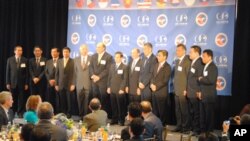Emerging from a meeting with US business leaders on Friday, a senior Cambodian investment official said the country is ready to start welcoming US interest.
Sok Chenda, secretary-general of the Council for the Development of Cambodia, said major US companies are starting to show an interest in Cambodia as well.
“These major US companies have experience in areas like agro-industry,” he said. “I hope all these companies will come to invest in Cambodia, because the most important thing for the investment of foreign companies in Cambodia, like that of the US, is that they already have their market.”
The US is strengthening its trade relations with Asean countries in a bid to boost its exports. Asean is now the fourth-largest export market for the US.
“Asean is the market for today for the United States, but it’s also the key to the future or the key to President Obama realizing his export initiative,” Alexander Feldman, president of US-Asean Business Council, told reporters after a breakfast meeting with Asean leaders Friday.
Since taking office in 2009, President Barack Obama has set export as a main target to bring the US out of its financial slump.
Asean is situated between two emerging economies, China and India, giving it a strategic importance for balancing economic growth and trade for the US.
Asean groups Brunei, Cambodia, Indonesia, Laos, Malaysia, Myanmar, Philippines, Singapore, Vietnam, and Thailand and a total population of 600 million people.
“There are large concerns about our commitments, about our focus, and about our optimism,” US Assistant Secretary of State Kurt Campbell told Asean leaders. “I want to tell of you how much we appreciate our Asean friends for many things. But one of the most important things that you have done for us is encourage us to remain very strongly engaged in a region which is absolutely central not only for our prosperity, but for our future and our security.”
Sok Chenda said Cambodia's main investment challenge is infrastructure, not human resources.
“We have been trying to build infrastructure, like bridges, roads, electricity and water, every year, but it is not yet up to fully functioning to serve the private sector,” he said. “Therefore, the only challenge that we have to overcome is the infrastructure.”




